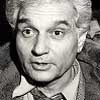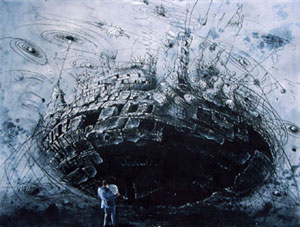[…5…] One should not develop a taste for
mourning, and yet mourn we
must.
[…13…] What happens when a great
thinker becomes silent, one whom we
knew living, whom we read and reread,
and also heard, one from whom we were
still awaiting a response, as if such a
response would help us not only to think
otherwise but also to read what we
thought we had already read under his
signature, a response that held everything
in reserve, and so much more than what
we though we had already recognized
there?
[…1…] I still cannot remember when I read
or heard his name for the first time, and
then how he became one for me. […7…]
There was already in this first reading a
certain experience of apophatic silence, of
absence, the desert, paths opened up off
all the beaten tracks, deported memory—
in short, mourning, every possible
mourning.
[…4…] The name races towards death
even more quickly than we do, we who
naively believe that we bear it. […9…] It
gives the concept, the concept of death
and all other concepts insofar as they bear
death. […3…] But in this place where now
one no can answer for him, in the absolute
silence where we remain nonetheless
turned toward him, I would venture to
wager that, in a sentence that I will not
construct for him, he would have
associated and yet also dissociated, he
would have placed back to back, mastery
and death, that is, the same—death
and the master, death as the
master.
[…8…] Yes, an intense desire to begin
again now, to begin, in truth, to read him
today, and I will do so, as if I could still
hope to surprise, on the other side, on the
other side of a cry or of a song of
perpetual coming, the share of darkness
in a voice that I know, that I can still hear
very distinctly, as if I were finally going to
be able to see this voice on the
side from which it is coming to this
immense poem, fromtheother
side, the side of the body, deep down in the
throat where it is engorged (and I even
hear in this expression the name of the
gorge cut into the mountainside, not far
from some spring or source, but also the
fall: the fall, and then the torrent, the
dam, high tension, danger of death). […]
[…10…] Tell me why we wait for death.
[…6…] I wish now to turn it over to him,
to let him speak. […14…] No border is
given, no shore (rive) at which to
arrive or to allow this phrase to arrive.
[…11…] The answer must each time be
invented, singular, signed, and each time
only one time like the gift of a work, a
giving of art and of life, unique and, right
up until the end of the world, played back.
[…2…] Never content merely to present
new readings, he led one to think the very
possibility of reading—and also
sometimes the paradox of its
impossibility. […12…] Undoubtedly, this
was the necessary condition in order to
leave on the philosophy of this century the
deep and incomparable mark that will
always be his.
----
Each sentence comes from one of Derrida’s texts on the passing of friends; collected under the title: The Work of Mourning, printed by The University of Chicago Press, 2001. Numbers correspond to each entry: [1] Roland Barthes, [2] Paul de Man, [3] Michel Foucault, [4] Max Loreau, [5] Jean-Marie Benoiste, [6] Louis Althusser, [7] Edmond Jabes, [8] Joseph N. Riddel, [9] Michel Serviere, [10] Louis Marin, [11] Sarah Kofman, [12] Gilles Deleuze, [13] Emmanuel Levinas, [14] Jean-Francois Lyotard.
---
Links:
Read a full obituary: International Herald Tribune
Remembering Jacques Derrida



